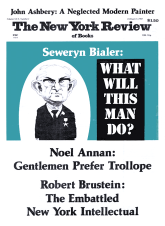In response to:
The Shrink Princess from the December 16, 1982 issue
To the Editors:
I have been working on a book on Marie Bonaparte’s analysis and relationship with Freud, including a study of her pyscho-analytic works, for four years. My sources were made available to me by HRH Princess Eugenie of Greece and Denmark from those materials retained by Marie Bonaparte for her biographer prior to 2020. These materials were made available to Celia Bertin for her book Marie Bonaparte, a Life.
Phyllis Grosskurth’s review of Bertin’s book [NYR, December 16], in which she calls it “a spicy, but insubstantial hors d’oeuvre,” is not only an expression of sour grapes, but misleading.
Grosskurth seeks to leave the reader with the impression that Bertin had access to papers in the Library of Congress that Grosskurth was denied. That is not the case. In fact, it was apparently only after Grosskurth learned in Paris that Bertin was at work on her book, that Grosskurth sought to gain access to the Library of Congress for a competing work. It is unfortunate when a reviewer allows the personal pique of a johnny-come-lately to bias her review of another’s work.
But it is even worse when she laces her review with poisonous distortions of fact and interpretation that do a disservice to Freud, Bonaparte, Bertin, and the reader. One example is illustrative of the many; Grosskurth writes:
A bond was immediately established between Marie and Freud. She showed him her breast. “I am seventy,” he told her. “I was in good health, but there are a few little things that don’t work anymore…that is why I warn you: you must not attach yourself too much to me.”
As Bertin recounts, an immediate intellectual and emotional bond was established between the two. It was at this time that Freud made the above statements (Bertin, p. 154). The incident of Marie’s showing her breast to Freud occurred later in a different context (Bertin, p. 156).
Grosskurth also insists that “any attempt to make her [Marie Bonaparte] into a forerunner of modern feminism is ludicrous.” The reader is, of course, free to judge for herself; but at the least, it is interesting that the woman quoted by Friedan, Koedt, and Millett as “anti-feminist,” considered her own third-rate education to have been motivated by the “curse of my sex”; she knew she would not have been treated as she had been if she were a boy. Marie also considered marriage as another kind of curse, that stifled all women. These and many more facets of Marie’s fascinating life are presented in Celia Bertin’s Marie Bonaparte, a Life, a book that is absorbing from beginning to end.
Frank R. Hartman
New York City
Phyllis Grosskurth replies:
Dr. Hartman says that the materials he and Bertin have been using are different from the restricted papers in the Library of Congress. How does he know? Has a careful collation been made? And by whom?
He also tells us that he and Bertin are using materials “retained by Marie Bonaparte for her biographer.” How fortunate her trustees have been able to find at least two biographers who are willing to accept restrictions that ensure a partial view of their subject. It is such a travesty of the pursuit of truth as to be scarcely credible.
This Issue
February 3, 1983



